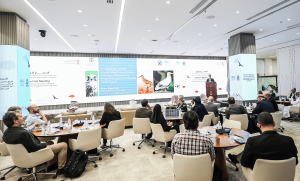Saudi Arabia Launches Regional Task Force to Combat Illegal Taking of Migratory Birds
UN-backed initiative brings together regional partners in Riyadh to strengthen cooperation and protect threatened species
The newly formed South-West Asia Illegal Taking of Birds Task Force (SWAI-TBT) brings together range states across the region to coordinate efforts to reduce illegal bird killing and ensure the protection of species that migrate through South-West Asia.
The task force was launched with support from the National Center for Wildlife, Saudi Arabia’s official focal point to CMS, and follows the Kingdom’s recent recognition by the CMS Secretariat with the CMS Champion in acknowledgment of its leadership in protecting migratory species.
Each year, millions of migratory birds pass through South-West Asia, including species such as the Steppe Eagle, Sociable Plover, and several threatened falcon populations. Illegal hunting and unregulated trade continue to pose serious threats to their survival, despite international conservation efforts.
“This initiative brings governments in the region together to collaborate on a shared conservation goal which cannot be addressed alone,” said Amy Fraenkel, Executive Secretary of CMS. “By increasing the capacity of key players, aligning laws, enforcement, and on-the-ground conservation across South-West Asia, this Task Force gives us a realistic chance to shut down the trafficking routes and illegal taking hotspots that have decimated iconic species. It is a model of multilateral cooperation that can deliver real results for wildlife and people alike.”
Saudi Arabia is leading this collaborative initiative to help countries improve national regulations, close enforcement gaps, and promote shared strategies for conservation and compliance. The task force also aims to build capacity among law enforcement and judicial bodies, promote information exchange, and raise public awareness about the importance of protecting migratory species.
Dr. Mohammed Qurban, CEO of the National Center for Wildlife in Saudi Arabia, emphasized the importance of collective action: “Saudi Arabia is proud to lead this effort to protect migratory birds that connect our continents and habitats. Through this task force, we are working with our neighbors to share expertise, align enforcement practices, and ensure these species are safeguarded for future generations.”
The SWAI-TBT will also support implementation of the South-West Asia Action Plan on Illegal Bird Killing and promote alignment with existing CMS initiatives, including the Raptors MOU, the African-Eurasian Migratory Landbirds Action Plan, and the Central Asian Flyway.
This initiative contributes directly to global conservation goals, including Target 5 of the Kunming-Montreal Global Biodiversity Framework, which calls for ending illegal and unsustainable use of wild species.
The launch of this task force reflects Saudi Arabia’s broader environmental commitments under Vision 2030 and highlights its growing role in advancing regional and global biodiversity cooperation.
Kenana Dahlan
National Center for Wildlife
email us here
Legal Disclaimer:
EIN Presswire provides this news content "as is" without warranty of any kind. We do not accept any responsibility or liability for the accuracy, content, images, videos, licenses, completeness, legality, or reliability of the information contained in this article. If you have any complaints or copyright issues related to this article, kindly contact the author above.
Outsource Accounts Payable Services Help Real Estate Firms Streamline Financial Operations
Growing at 31.20% CAGR | IoT Security Market Reach USD 73.92 Billion by 2026 Globally
Hammocks Market to Reach USD 768 Million by 2035 | Key Players: Eagles Nest Outfitters, Grand Trunk, Hatteras Hammocks
Więcej ważnych informacji
 Jedynka Newserii
Jedynka Newserii

 Jedynka Newserii
Jedynka Newserii

Konsument

Tylko 35 proc. Celów Zrównoważonego Rozwoju ONZ możliwe do osiągnięcia przed 2030 r. Potrzebna ściślejsza współpraca międzynarodowa
Jak wynika z raportu ONZ, choć w ciągu ostatniej dekady dzięki dążeniu do realizacji przyjętych celów udało się poprawić życie milionów ludzi na całym świecie, to jednak tempo zmian pozostaje zbyt wolne, by dało się je osiągnąć do 2030 roku. Postęp hamują przede wszystkim eskalacja konfliktów, zmiana klimatu, rosnące nierówności i niewystarczające finansowanie. Jak wynika ze sprawozdania Parlamentu Europejskiego, problemem jest także brak ścisłej współpracy międzynarodowej i sceptyczne podejście niektórych państw ONZ.
Przemysł spożywczy
UNICEF: Wszystkie dzieci poniżej piątego roku życia w Gazie cierpią z powodu niedożywienia. Sytuacja jest katastrofalna

Ataki Izraela na Strefę Gazy i jej izolacja doprowadziły do całkowitego załamania podstawowych usług i ograniczenia możliwości dostaw i dystrybucji pomocy humanitarnej – wskazuje UNICEF. W efekcie setki tysięcy Palestyńczyków są w sytuacji ciągłego zagrożenia życia i cierpią z powodu niedożywienia i głodu. Ta klęska dotyczy praktycznie wszystkich dzieci poniżej piątego roku życia. Konflikty są jednym z głównych przyczyn braku bezpieczeństwa żywnościowego, głodu i niedożywienia na świecie. Szczególnie dotyczy to Afryki i Azji Zachodniej.
Prawo
Branża ciepłownictwa czeka na unijną i krajową strategię transformacji. Liczy na większe fundusze i korzystne regulacje

Komisja Europejska zapowiedziała rozpoczęcie w I kwartale 2026 roku prac nad strategią dla ciepłownictwa i chłodnictwa. Nad tym strategicznym dokumentem w zakresie ciepłownictwa pracuje także polski rząd. Branża podkreśla, że obie te strategie będą miały kluczowe znaczenie dla trwającej transformacji w ciepłownictwie, czyli przyszłości ogromnych inwestycji, które czekają sektor do 2050 roku. Jednocześnie apeluje o większe wsparcie tego procesu ze środków publicznych.
Partner serwisu
Szkolenia

Akademia Newserii
Akademia Newserii to projekt, w ramach którego najlepsi polscy dziennikarze biznesowi, giełdowi oraz lifestylowi, a także szkoleniowcy z wieloletnim doświadczeniem dzielą się swoją wiedzą nt. pracy z mediami.


![Nestlé w Polsce podsumowuje wpływ na krajową gospodarkę. Firma wygenerowała 0,6 proc. polskiego PKB [DEPESZA]](https://www.newseria.pl/files/1097841585/fabryka-nesquik_1,w_85,r_png,_small.png)






.gif)

 |
| |
| |
|